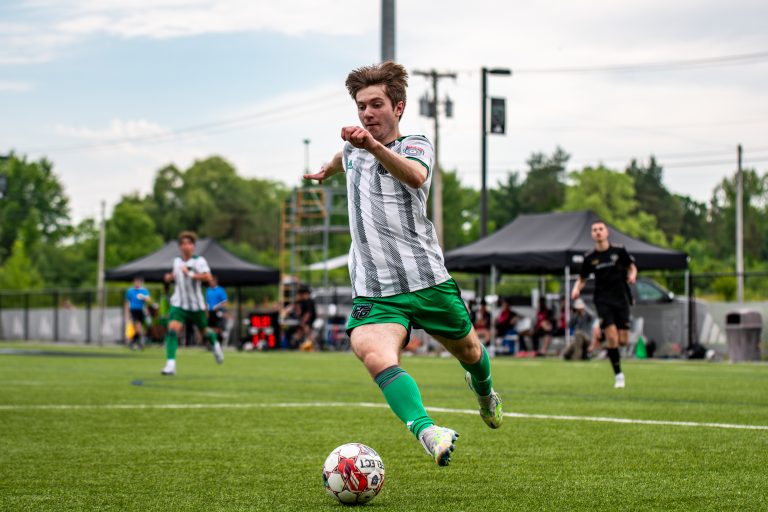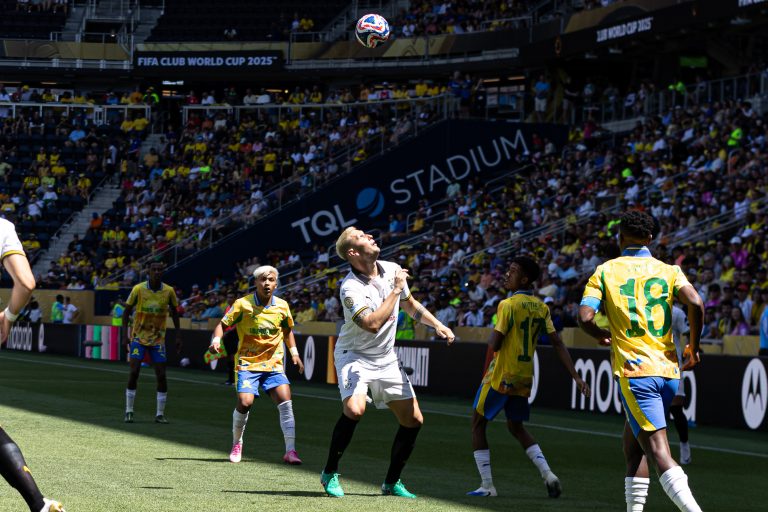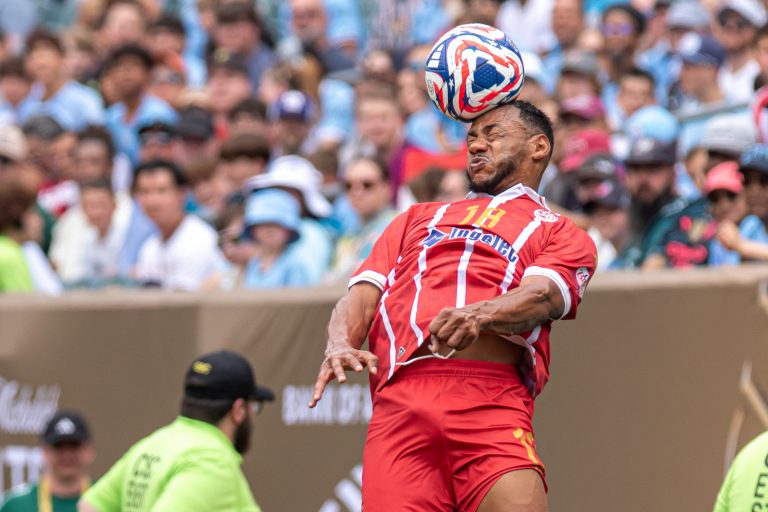
Everyone knows Elon Musk, the world’s richest man and an individual willing to take big risks for even greater rewards. The growth seen in Tesla, SpaceX, and even the hyperloop are just unreal. Musk is truly an immense character that has the potential to impact American entrepreneurship unlike any other person in history. He can be the next Ford, Edison, Gates, Jobs, Bezos, or just surpass everyone altogether.
Oakland’s own Benno Nagel is a similar figure in American soccer, someone who could upset the status quo and take the American game to unforeseen levels. His reputation as a community builder made Oakland Roots one of the hottest soccer properties in the country, literally putting the Bay area on the soccer map. He’s someone who can bring values to life within a club’s community footprint and it shows in a big way.
Their merchandise has been embraced by some of the biggest names in pop culture, including musical icons G-Easy, Mistah F.A.B., and Zion I and professional basketball standouts Damian Lillard and Kevin Looney. On the soccer side, the Roots brand could be found in FourFourTwo magazine and with the Men in Blazers.
The Roots brand has become synonymous with doing things the right way, engaging the community and caring about things like social justice, service, pride, philanthropy, and education. Even though Nagel is no longer with the Roots, his footprint on the club is forever. The Roots clearly wouldn’t have experienced success in launching NISA and NPSL teams without Nagel at the helm as Founder and President. Today they are just a step away from our country’s biggest stage, Major League Soccer (MLS), as part of the USL Championship.
Nagel learned so many lessons as part of the Oakland Roots. His contested removal from the club is currently within the legal system in an effort to find resolution.
Everything Nagel faced could be considered a learning experience, both positive and negative.
“Pick the right partners,” Nagel said. “I can’t stress that enough. But beyond that, I witnessed firsthand that anything still remains possible in our country if you have committed people with a vision who are willing to wake up every day and push the ball forward. Thru our success I was also rather confused in that people gave Roots a lot of praise for doing things in our approach that seemed normal to me and completely natural. Why wouldn’t you have genuine conversations with people about what they wanted to see from their local club? Why wouldn’t you make yourself available to support local causes? Why wouldn’t you adopt a philosophy that was about ‘rooting’ yourself to local values? What we did and the praise we got is, to me, more of an indictment on the state of pro soccer in our country than any secret formula that we possessed. Be genuine, be available and be consistently present. It’s really no more complex than that.”
With his Roots journey coming to a close, Nagel latched on to the newest challenge as Technical Director of Oakland Soccer Club. The club gained a leader with literally a world of experience of Holland, Croatia, and of course the U.S.
Nagel spent time at two European powerhouses, FC Twente and GNK Dinamo, known for developing players for the highest level of the global game. The experience changed him as a coach and showed him what was really needed to succeed in the beautiful game.
“As for my time overseas, I took a lot away in terms of the value of culture on a sporting environment,” Nagel said. “Both in Holland and in Croatia there were heavy, heavy sporting cultures. I would come home from training and would be walking in the grocery store or through the mall wearing my work clothes (training gear) and literally every person you would walk by would look at you with respect. It was a really odd experience for me as in the states, wearing your club gear would be something that nobody would ever take notice of. That reality struck home to me the cultural respect assigned to those involved in the game and what that means in terms of motivation for the players and coaches, who see the pursuit of that career as a real thing.”
Based on these formative experiences, he was able to identify a way forward for American soccer.
“So many players and coaches in this country drop out of high-level achievement because they don’t see a future in it,” Nagel said. “On the soccer side, I noticed two things. First and foremost, the level is very high in terms of playing and coaching but at the same time it is not something that can’t be reached by Americans, or even surpassed. There are a lot of bad coaches overseas and the best coaches that I have seen in the U.S. are more than capable to work successfully in Europe. It really comes down to opportunities to be exposed to the environment and then to allow for time to see who sinks and who swims. The second thing I took away is the benefits of a really high failure rate for both players and coaches. European football at the top levels in unforgiving and people get punished extremely for their mistakes. Make a bad pass, don’t capitalize on a big moment in a game and the opposition will punish you. If you play or work at a big club then there will always be people coming for your job. You could view these as stressors, which they can be, but mostly they can be great motivators for those who really want to reach a high level. The proximity to failure and the reality of extreme competition is what pushes players and coaches abroad to be better.”
In Nagel’s opinion, being comfortable with the status quo is hurting the American game.
“There are too many comfortable people in U.S. Soccer,” Nagel said. “Comfortable players, comfortable coaches, comfortable directors, comfortable owners, comfortable leagues. The lack of extreme competition holds our country back from growth and that was my biggest takeaway from my time overseas.”
He believes that these issues are holding the game back all across the U.S.
“I see both Oakland and U.S. Soccer at a major crossroads,” Nagel said. “There is clearly a very entrenched corporate culture in soccer ownership which you can see in both Oakland and also across the country. Soccer is a game of the people and needs to have a deeper connecting into the communities which these teams serve. What you see now is a recognition from clubs about community but still very much there is a manufactured or ‘branded’ approach to community impact. Impact now apparently lives on social media or in some fancy video or marketing campaign and as we all know, that lack of understanding of the importance of being present in people’s lives is what continues to hold our nation back. Young players need to feel connected to their local club. It has to be something they can see, touch, taste and smell. The U.S. soccer culture has grown but it still lacks passion and conviction, and the fan bases locally aren’t mature enough in their growth to truly hold their local teams accountable. It leaves environments for pro clubs that are void of pressure and that therefore becomes a major hindrance to growth.”
Nagel experienced the meteoric rise and unfortunate fall of a club and league during his time as an assistant coach with Rayo OKC of the NASL.
“Many people view Rayo OKC as a failure and to me, that couldn’t be farther from the truth,” Nagel said. “Going back to the need to pick the right partners, then yes, Rayo did not have the right partners in so far as Rayo Vallecano and the foreign ownership there. But Sean Jones (the local owner) and his team along with Head Coach/Technical Director Alen Marcina and everyone involved with the staff, including the players, had a massive success there. There were a lot of fans around that team prior to the financial issues occurring and if you look at the on the field results, Rayo was a top NASL club for that season. They did a tremendous job of engaging within the Latino community and had the ownership structure been different then I think that club still exists today as a top lower league club in the country.”

Nagel is an expert on grassroots soccer because that is where he started. He spent time as a defender at NorCal Lamorinda SC (NPSL), Bay Area Ambassadors (NPSL), Real San Jose (NPSL), and El Farolito (SFSFL). The latter is best known for winning the U.S. Open Cup in 1993 and joining the NPSL in November of 2017.
Nagel was greatly influenced by El Farolito owner and director Salvador “Don Chava” Lopez.
“El Farolito was definitely the highlight of my playing career,” Nagel said. “I’m forever grateful to have been able to experience an environment like the one that Chava provided us. I was there for two and a half seasons and we achieved a lot there, which was expected but still a lot of fun. It was a true sporting environment given that we were paid athletes and so there was real accountability to perform, there was weekly competition within the squad as we had a top team for that level and there were always trialists in training coming to try and force someone out of the team. It was sink or swim and at the same time it was a family environment where we all supported each other. Chava was the perfect owner for a team as he was a man of extreme ambition but who also recognized the importance of taking care of his players and staff. My first year in the team I played with Horacio Sanchez, who had played a full career with Pumas and capped multiple times with the Mexican National team. We also had Jose de Jesus Mosqueda, who had been on the books of Club America within the last two years at the time he signed on with us. You don’t see teams in the USL with players on their roster like that. Also, being one of only a handful of white players to have ever be invited to that team was an honor. To share a history like that with a guy like Zak Ibsen who had played for our national team and in MLS for multiple years is an honor that I’ll forever be grateful to Chava, Santiago, and the entire Lopez family for providing me. He will be missed greatly but Santi will carry on the legacy and continue to forge new paths forward for the club.”
“My time in the NPSL feels worlds apart from today,” Nagel said. “First and foremost, we did not have such a saturation of clubs regionally as there is today. There was always a strong contingent of clubs in the Golden Gate Conference but the ambition and organization of the clubs has grown considerably. I played one season with NorCal Lamorinda SC which had a roster with players such as David Bingham, Andrew Weideman, Hector Jimenez, and several other guys who went on to play professionally in the MLS, USL, and abroad. We made the regional finals and then folded the year after. This was a pattern for a lot of clubs, both in the NPSL and PDL, during that time and so it is great to see a lot more stability and vision from the NPSL clubs locally in the Bay Area.”
Nagel, who also helped launch Project 51O, has been thoroughly impressed with the work the NPSL has done in recent years.

“On the league front overall, I think there has been year over year growth with no shortage of big ideas now being present amongst the member clubs in the league,” Nagel said. “I was very close to the Founders Cup and can say that the failure of that project was not due to failure on behalf of the NPSL but rather a really frustrating issue revolving around player insurance. Seeing the ambition of the league to even attempt that idea was a big success, and I’m confident that they will continue to explore ways to provide expanded opportunities for their members which at the end of the day trickles down to players and player development. If only I had been born a few years later!”
Nagel also has a plethora of experience in the youth and college ranks, spending time at San Mateo County Star, San Ramon FC, California Odyssey SC, Holy Names University, Diablo FC, and Ballistic United SC. That’s just another reason why he’s a perfect fit to lead Oakland SC.
“The project with Oakland Soccer Club is 100% a labor of love and a commitment and doubling down on all things Oakland,” Nagel said. “We have seen firsthand what the impacts of pay to play sports are on communities of color, with OSC serving as a great example in having decreased in membership from 1200 players in 2006 to a little under 500 in 2021 largely due to families in our area not being able to afford the cost of fee-based membership. At the same time, Oakland continues to experience rapid rates of redevelopment and gentrification which leave more and more of our youth in insecure life positions. Soccer, and sport, have long been a vehicle to positively engage youth and OSC represents a tremendous opportunity to do just that. I would hope my rather extensive background in the sport, which spans across youth, collegiate, and professional soccer, including having worked in two different countries in Europe, will provide me with a unique lens and base of experience to draw from in terms of finding solutions to problems we face in Oakland. Most importantly, I bring a passion for Oakland and wish to continue to give back to my hometown in whatever ways possible I can.”
Nagel expects Oakland SC to have an even greater impact on the community.
“OSC has been in existence since 1974 and in that time has served countless thousands of Oakland youth,” Nagel said. “Our service area, and membership, has traditionally been comprised on black and brown youth players who are not typically well represented in more affluent clubs where membership fees are often times cost prohibitive. OSC has therefore provided an avenue for youth soccer players to enjoy access to the game and in doing so to reap the benefits of things such as physical activity, positive self-esteem and overall, just learning how to work within a team environment and cooperate with people through sport and in life. For a child experiencing hardship in their life, I cannot express enough how valuable having positive outlets like the ones OSC provides can be. Oakland needs more of this and we intend to continue to provide that to our community as we move forward.”
American soccer is lucky to have someone like Benno Nagel leading the way. He truly cares about his community and is poised to be the next major influence on the sport. As Elon Musk changes the world with technology, Nagel creates exciting brands and makes the game a more inclusive, accessible, and welcoming place for all people. Remember his name as it will be personalities like Benno Nagel that will be making an impact on the beautiful game for decades to come.





